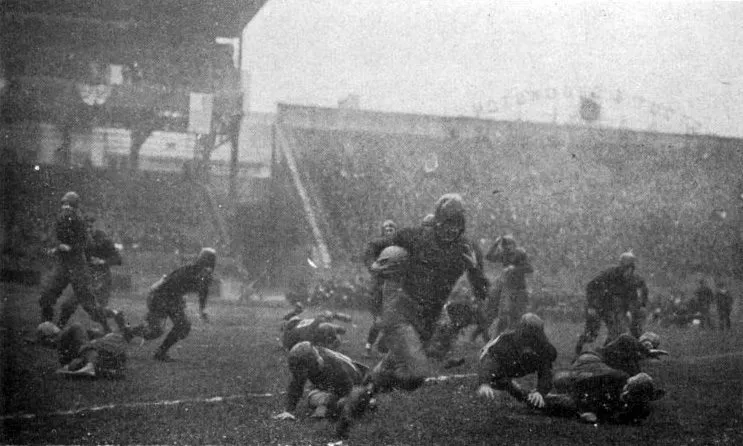WVU Football
100 Years Ago: Pitt-WVU Backyard Brawl Becomes First Broadcast of a College Football Game

By Bob Fulton
Harold Arlin purchased a ticket for a ground-level box seat at Forbes Field, placed a wooden plank across the armrests to create a desk of sorts, spoke into a makeshift microphone that he dubbed a “mushophone”—and made a bit of history 100 years ago.
A 25-year-old studio announcer at KDKA, the nation’s first commercial radio station, Arlin described the action as Pitt defeated West Virginia 21-13 on Oct. 8, 1921, the first broadcast of a college football game. Stations would soon crop up across the country and begin transmitting games to listeners who couldn’t attend in person, following in Arlin’s tentative footsteps.
“I had no idea what I was starting,” he said years later. “We were cognizant that it was the first football game broadcast on radio. But radio was so new. We were experimenting. We didn’t know we were making history or anything like that.”
Westinghouse Electric Co.-owned KDKA first went on the air Nov. 2, 1920. Arlin, a Westinghouse engineer, was hired as an announcer because his voice was so “clean, crisp, resonant, friendly and appealing.” He read election results, news headlines and community service bulletins, spun records and chatted between songs. And on Aug. 5, 1921, he became the first person to broadcast a major league baseball game.
Arlin returned to the same seat two months later, again speaking into a makeshift microphone that looked like “a tomato can with felt lining”—the mushophone.
The Pittsburgh Press publicized the fact that the game would be carried over the airwaves.
“As the Panthers defend the colors of the University of Pittsburgh on the football field, their performance will be announced by radiophone,” the Press noted. “This will afford the alumni and friends of the team, who on account of living at a distance will not be able to attend the game, an opportunity of having the game brought to their homes.”
West Virginia traveled to Pittsburgh with a 2-0 record, having outscored its opponents 84-3, yet the Panthers were prohibitive favorites. Pitt to that point was 42-4-3 under legendary coach Glenn “Pop” Warner and hadn’t suffered a setback in the Backyard Brawl since 1903. WVU seemed overmatched.
But the Mountaineers of first-year coach Clarence “Fats” Spears “gave one of the best exhibitions of straight football and spectacular plays ever seen in this city,” according to one account, and nearly pulled an upset.
Not that Arlin could recall any details years later.
“As I look back now, I don’t really remember much about the game,” Arlin said. “What I remember most is that West Virginia had three players named Hill. One of the Hills scored on a 90-yard kickoff return and I never was sure if I had the right one.”
George Hill scored both WVU touchdowns that day, but his electrifying performance wasn’t enough to overcome the Panthers. Halfback Charles Winterburn and fullback Orville Hewitt scored on short runs before Charles “Poke” Williams, a late substitute, tossed a 5-yard TD pass to Tom Holleran early in the fourth quarter to give Pitt the lead for good on a cold, drizzly day.
“This Wellsburg lad, who, according to geographical location, belongs to the Mountaineers, was the biggest factor in sending them back to Morgantown defeated but not disgraced, after an hour’s argument under the most unsatisfactory conditions,” noted the Pittsburgh Post. “For ‘Poke’ came in and what he did was plenty. His very introduction seemed to put the punch in the Pitt crew.”
Arlin returned to Forbes Field on Nov. 5, when the highly touted Nebraska Cornhuskers visited. The memory of his second game–a 10-0 Nebraska victory–was more vivid than the first, mainly because he knocked his radio station off the air. Moments after Clarence Swanson scored on a 61-yard pass play to give the Huskers a 6-0 second-quarter lead, KDKA suddenly went silent.
“I got a little excited and yelled into the microphone so loud that it knocked the needle off the modulation meter and we were off the air for several minutes,” Arlin recalled years later. “I had no idea this had happened and kept right on talking.”
Glitches aside, Arlin launched a veritable revolution a century ago, armed only with a mushophone and his “clean, crisp, resonant” speaking voice. His memories of Pitt’s victory over West Virginia 100 years ago might have been fuzzy, but what’s crystal clear is that he made a bit of history that day.




















